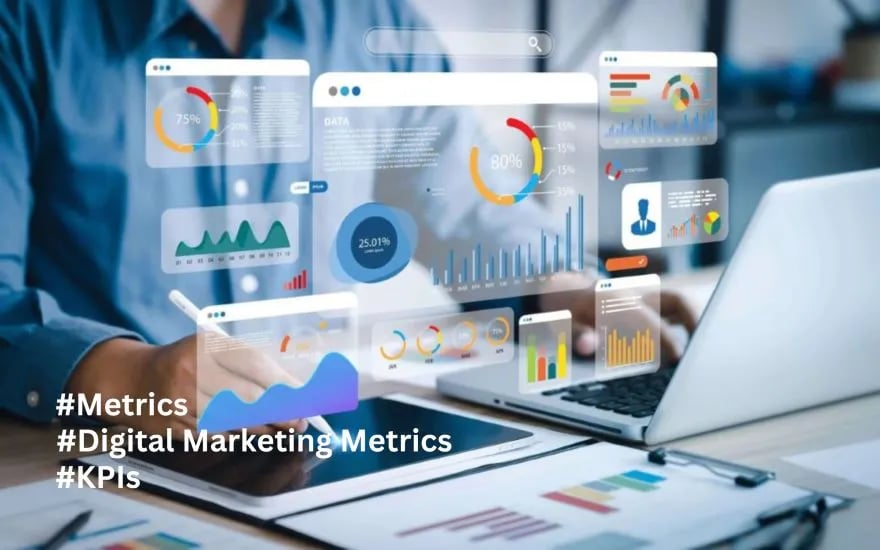
Metrics play a vital role in shaping your digital marketing strategies and determining the success of your business. Understanding these metrics is crucial for tracking your website performance, attracting customers, generating leads, and ultimately increasing your brand visibility. In this post, we will explore key digital marketing metrics and KPIs that you should monitor to enhance your marketing efforts, with insights drawn from industry leaders like Mister Nguyen Agency. Get ready to elevate your social media and design brand strategy through data-driven decisions.
Understanding Digital Marketing Metrics

To truly excel in digital marketing, it’s imperative to grasp the significance of marketing metrics. These metrics provide insights into your website’s performance, customer behaviors, and the effectiveness of your campaigns. By understanding these numbers, you can make informed decisions that enhance your business’s overall strategy and drive growth.
Definition and Importance
Understanding digital marketing metrics involves recognizing how they quantify your marketing efforts. They help you measure success and inform your strategy, ensuring that every action aligns with your objectives. Without these insights, you risk wasting resources on ineffective campaigns that don’t resonate with your customers.
Types of Digital Marketing Metrics
Types of digital marketing metrics can be categorized into various groups that help you analyze the performance of your website and marketing campaigns. Here’s a concise breakdown:
| Traffic Metrics | Measures user visits to your website |
| Engagement Metrics | Tracks how users interact with your content |
| Conversion Metrics | Evaluates how many visitors become leads or customers |
| Retention Metrics | Assesses customer loyalty and repeat visits |
| Social Media Metrics | Analyzes engagement and reach on social platforms |
Knowing your metrics can indicate areas for improvement, guiding you to create a more effective digital marketing strategy tailored to your customers.
Types of digital marketing metrics include key performance indicators that vary across your different marketing channels. From your website’s traffic to conversion rates, understanding these categories enables you to evaluate your business’s overall performance effectively. Here’s a further breakdown:
- Traffic Sources
- Bounce Rates
- Lead Generation Rates
- Return on Investment (ROI)
- Click-Through Rates (CTR)
| Traffic Sources | Shows where your visitors originate |
| Bounce Rates | Indicates the percentage of visitors leaving immediately |
| Lead Generation Rates | Measures effective lead acquisition strategies |
| Return on Investment (ROI) | Calculates profitability of your investments |
| Click-Through Rates (CTR) | Assesses effectiveness of your ads and content |
Knowing these types of metrics empowers you to refine your marketing strategies and ensure that you are targeting your customers effectively for maximum impact.
Key Performance Indicators (KPIs)

Now that you understand the significance of digital marketing metrics, it’s time to probe into Key Performance Indicators (KPIs). KPIs are imperative benchmarks that help you assess the effectiveness of your digital marketing efforts across various channels, be it your website, social media platforms, or online campaigns. By closely monitoring these indicators, you can make informed decisions, optimize your strategies, and ultimately drive better results for your business.
Identifying Relevant KPIs
Relevant KPIs depend on your specific business objectives and audience. You should select indicators that align with your goals, such as website traffic, conversion rates, customer engagement, and lead generation. By understanding your customers’ needs and behaviors, you can pinpoint the metrics that will provide the most valuable insights into your marketing performance.
Aligning KPIs with Business Goals
Against the backdrop of your overall business goals, aligning your KPIs is vital for strategic success. The KPIs you choose should not only reflect your marketing initiatives but also resonate with your broader objectives such as increasing sales, improving customer retention, or enhancing brand awareness through social media and design strategies.
Due to the interconnectedness of marketing efforts and business goals, choosing the right KPIs can make a significant difference. By ensuring that your KPIs align with your strategic objectives, you can track your progress effectively and make adjustments where necessary. This alignment will not only help you evaluate the return on investment (ROI) for marketing efforts executed by agencies like Mister Nguyen Agency but also guide you in understanding your customers’ journey from leads to conversions, ultimately driving your business forward.
Traffic Metrics

After understanding your business’s goals, examining traffic metrics is important to gauge your website’s performance. These metrics provide insights into how users are finding your site and can help identify which strategies are driving customers and leads your way. By closely monitoring this data, you can optimize your marketing efforts and enhance your overall digital presence.
Source and Channel Tracking
After implementing various marketing strategies, you’ll want to track where your website traffic is coming from. Source and channel tracking allows you to determine whether visitors are arriving via social media, organic search, paid advertising, or direct traffic. Knowing which channels are most effective helps you allocate resources more efficiently and improves your ability to nurture leads.
Engagement and Bounce Rates
Tracking engagement and bounce rates aids you in understanding how users interact with your website. High engagement indicates that visitors find your content valuable, while high bounce rates suggest that your site may not meet their expectations or needs. Monitoring these metrics helps you create a more effective user experience and retain potential customers.
The measurement of engagement and bounce rates serves as a window into the behavior of visitors on your website. A low bounce rate indicates that your business successfully captures the attention of customers, encouraging them to explore further and convert into leads. In contrast, high bounce rates may signal issues with user experience or content relevance. By analyzing these rates, you can optimize aspects such as page design, content quality, and even branding efforts from your collaborations with agencies like Mister Nguyen Agency to enhance customer retention and lead generation.
Conversion Metrics

For any business engaged in digital marketing, understanding conversion metrics is crucial to measure the effectiveness of your campaigns. These metrics provide insights into how well you are turning your website visitors into leads and customers. By analyzing conversion rates, you can optimize your marketing strategies and enhance your return on investment, ultimately driving growth for your business.
Understanding Conversion Rates
Understanding conversion rates is vital for evaluating your website’s performance. This metric indicates the percentage of visitors who complete a desired action, such as purchasing a product or signing up for a newsletter. By tracking your conversion rates, you can identify areas of improvement and make data-driven decisions to enhance the customer journey while boosting your leads and sales.
Funnel Analysis
Analysis of your conversion funnel can provide deep insights into where you may be losing potential customers. A funnel is a visual representation of the stages a customer goes through before making a purchase or completing a desired action. By assessing the stages of your funnel, you can pinpoint bottlenecks that may prevent leads from converting into customers and optimize accordingly.
Further exploration of funnel analysis can reveal significant information about customer behavior on your website. You can track how visitors navigate through each stage and identify common drop-off points. By focusing your efforts here, you can enhance your social media outreach, refine your website design, and personalize your branding strategies with Mister Nguyen Agency, increasing your chances of converting leads into loyal customers.
Return on Investment (ROI)

All digital marketing efforts aim to generate profit for your business, making the measurement of Return on Investment (ROI) indispensable. By assessing ROI, you can determine the effectiveness of your campaigns, ensuring that your resources are effectively allocated to drive leads and convert customers. Understanding ROI allows you to refine strategies to maximize your revenue potential, whether through your website, social media, or design brand initiatives like those offered by Mister Nguyen Agency.
Calculating ROI in Digital Marketing
About calculating ROI in digital marketing, you need to collect data on your total investment and the revenue generated from your campaigns. The formula to calculate ROI is straightforward: subtract the total costs from the total revenue, then divide that number by your total costs and multiply by 100 to get a percentage. This metric will help you evaluate which marketing activities are driving the most value for your business.
Importance of ROI in Decision Making
Digital ROI is crucial when making informed business decisions about your marketing strategies. By tracking your returns, you can allocate your budget effectively and identify the best channels to reach your target audience. This insight enables you to adjust your campaigns to prioritize high-performance strategies, thus enhancing your overall marketing efficiency.
Marketing teams often face challenges in justifying expenses, with ROI serving as a powerful tool in your arsenal. By demonstrating clear returns, you can secure budget approvals and increase investment in strategies that resonate with your customers. Moreover, understanding ROI empowers you to pinpoint underperforming campaigns and pivot your approach, optimizing your website and social media presence to better connect with leads and drive conversions. With tools like those provided by Mister Nguyen Agency, you can elevate your brand design and marketing, effectively enhancing your ROI and achieving sustainable growth.
Tools and Techniques for Tracking Metrics

Keep a close eye on your digital marketing performance by effectively utilizing various tools and techniques to track your metrics. Embracing technology can provide you with valuable insights into how your business is performing online, allowing you to refine your strategies and better engage with your customers. From website analysis to social media monitoring, using the right tools will help you build a solid foundation for driving leads and optimizing your design brand.
Analytics Platforms
Metrics are the backbone of your digital marketing efforts, and analytics platforms like Google Analytics, SEMrush, and HubSpot provide you with the data needed to measure your website’s performance. By analyzing user behavior, traffic sources, and conversion rates, you can identify areas for improvement and tailor your marketing strategies to suit your audience’s preferences, ultimately enhancing customer experience and satisfaction.
Leveraging Automation and AI
Along with traditional metrics tracking, leveraging automation and AI can significantly enhance your marketing strategy by streamlining processes and providing deeper insights. Automating data collection and reporting allows you to focus on strategy while AI tools can predict trends and user behavior, helping you make data-driven decisions.
Due to advancements in technology, your business can now utilize AI-driven tools to analyze vast amounts of data quickly. These tools can help forecast customer behaviors, analyze trends, and segment your audience more effectively. By optimizing your social media campaigns or designing targeted email marketing strategies, you can engage leads more efficiently and boost conversion rates. Investing time in automation not only saves you resources but ensures that your business stays ahead in the competitive digital landscape that Mister Nguyen Agency embodies.
To wrap up
Hence, understanding digital marketing metrics and KPIs is vital for you to effectively measure and enhance your website’s performance, ultimately driving your business forward. By focusing on how these metrics influence your customers and leads, you can fine-tune your strategies. Whether you’re leveraging social media or collaborating with Mister Nguyen Agency for brand design, your ability to analyze and adapt to these metrics will empower you to achieve long-term success. Embrace this knowledge to cultivate deeper connections with your audience and foster sustainable business growth.











